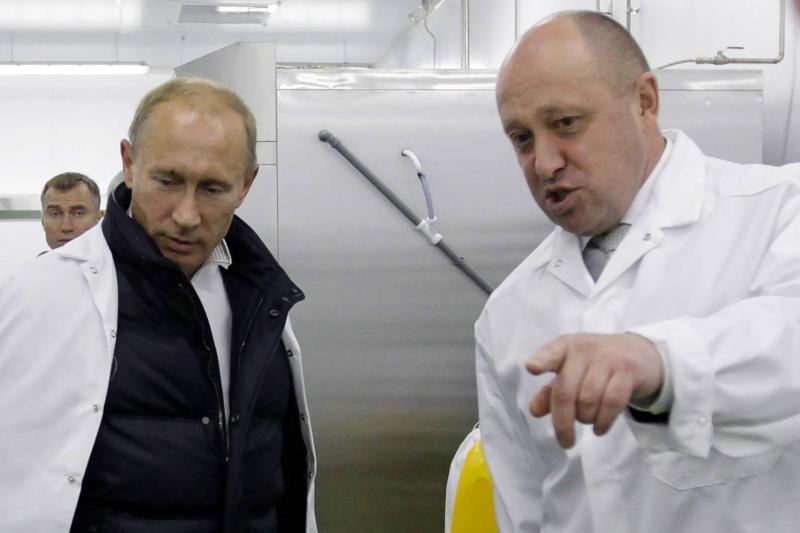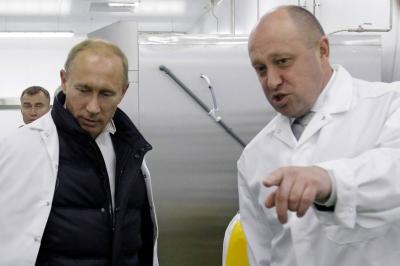The death of Yevgeny Prigozhin, the head of the Russian private military group Wagner, in a plane crash, temporarily strengthens Russian President Vladimir Putin by eliminating a powerful figure who challenged his authority and threatened to make him appear weak. However, his death—which has not been officially confirmed apart from a statement from aviation authorities confirming his presence on the plane—also deprives the Russian president of a shrewd and capable player who proved beneficial to the Kremlin by deploying group fighters to some of the bloodiest battles in the Ukraine war, as well as by bolstering Russian interests across Africa.
**Retributive Action**
Tatiana Stanovaya, founder of the consulting firm R.Politik, stated, "Whatever the reasons for the plane crash, everyone will see it as an act of retribution and punishment, and the Kremlin, in particular, will not intervene in this." She added, "From Putin's point of view, and that of many in the security and military sectors, Prigozhin's death should serve as a lesson for any potential followers."
**False Assumption**
The incident occurred two months after Prigozhin and Wagner mercenaries staged a mutiny, seizing a city in southern Russia and advancing towards Moscow, during which they shot down several Russian air force aircraft, resulting in the deaths of their pilots. Putin, who has previously expressed his hatred for traitors, described the event as a "stab in the back." Following the mutiny, Prigozhin ceased his ongoing criticisms of the defense establishment but continued to operate and move freely into and out of Russia, despite an agreement with the Kremlin that was supposed to transfer him to Belarus.
Abbas Gallyamov, a former Kremlin speechwriter currently labeled by Russia as a "foreign agent," said Prigozhin mistakenly assumed that Putin could not do without him due to the scope and importance of his activities. These activities included extensive operations in Africa, where Wagner expanded its mercenary services in countries like Mali and the Central African Republic in exchange for gold and diamond mining concessions. The Kremlin framed these activities as purely private business operations but used Wagner to expand Russian influence on the continent in competition with Western powers like France and the United States. Gallyamov stated, "Prigozhin assumed that Putin did not want to risk all this... He underestimated how important it is for Putin to send a message to all potential rebels: guys, don't think you can commit this and survive."
**'Game of Thrones'**
However, if Prigozhin's death is confirmed, it won't come without a cost for Putin. Analysts say it opens the possibility of chaotic infighting over control of Wagner's vast commercial empire, and the likelihood of a split between pragmatic elements willing to integrate with the Ministry of Defense and an embittered extremist nationalist faction already venting its anger on social media. Andrew Borene, CEO of Flashpoint Threat Intelligence and a former U.S. intelligence officer, remarked, "I think it's possible in many ways that an environment reminiscent of ‘Game of Thrones’ or ‘The Sopranos’ could emerge, where we have competition among factions and smaller offshoot groups of Wagner."
He added, "In the long run, I believe this is a strategic loss for Russia." Samuel Ramani, an analyst at the Russia Institute in London and author of the book "Russia in Africa," noted that the loss of Prigozhin's extensive network would negatively impact Putin. Ramani, speaking in a phone interview, said Putin "will lose many personal relationships that Prigozhin was able to establish on the continent, including the kind of relationships that could be crucial for exporting gold and diamonds from sanctioned countries like Mali and the Central African Republic."
On the same day the plane crashed, Russian state media announced the dismissal of Sergei Surovikin, the former commander of Russian war efforts in Ukraine, from his position as head of the air force. Widespread but unverified reports suggested that Surovikin was under investigation for possible involvement in Prigozhin's mutiny. Ramani remarked that the fall of both men could hinder Moscow's capacity to conduct sustainable offensive operations in the coming year. Both are widely regarded as among the most influential figures in a war where Russia has faced numerous embarrassing failures.
He added that if Putin was responsible for Prigozhin's death, it would demonstrate his readiness to engage in brutal suppression of any form of opposition. He went on to say, "But it also reveals vulnerability because he will now have to use force to suppress those nationalist extremists he was previously able to contain and co-opt into his coalition. This is not a positive indicator for Putin's ability to remain in power beyond 2024."




